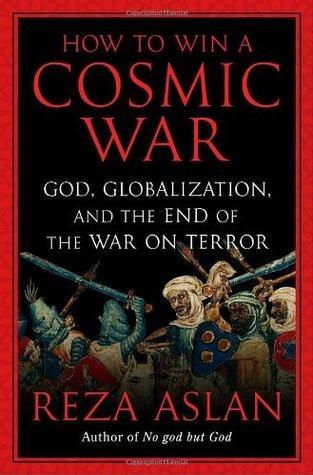Welcome to Compassionate Sunday. We're working through Twelve Steps to a Compassionate Life by Karen Armstrong, one step per month.
If you'd like to share a post about what you learned about compassion (The First Step), what you're seeing in your world (The Second Step), self-compassion (The Third Step), empathy (The Fourth Step), mindfulness (The Fifth Step), action (The Sixth Step), how little we know (The Seventh Step), how to speak to one another (The Eighth Step), concern for everybody (The Ninth Step), or knowledge (The Tenth Step) use the link list below. Or join the discussion in the comments or on Facebook.
Book: How to Win a Cosmic War: God Globalization, and the End of the War on Terror by Reza Aslan
Genre: Nonfiction
Publisher: Random House
Publication date: 2009
Pages: 228
Source: From our bookshelves (Rick read it a couple of years ago)
 Summary: As I mentioned in my post last week after reading about half of this book, all three of the major monotheistic religions currently have a highly-visible sub-culture of people who see themselves as cosmic warriors, people who believe that they aren't just fighting for their religion, but that they are fighting for God. The details are different for the three religions, but the motivations echo between them and feed off of each other.
Summary: As I mentioned in my post last week after reading about half of this book, all three of the major monotheistic religions currently have a highly-visible sub-culture of people who see themselves as cosmic warriors, people who believe that they aren't just fighting for their religion, but that they are fighting for God. The details are different for the three religions, but the motivations echo between them and feed off of each other.
The trick is to step in and stop the cycle somewhere:
This is the great paradox of social movements, whether religiously inclined or not: the more violent the reaction to the movement, the more violent the movement may become. What ultimately led to the deradicalization of the Liberation Theology movement-or, for that matter the environmental movement, the antiglobalization movement, the feminist movement, the black power movement, and so on-was the gradual co-option of their members' grievances into mainstream society. Indeed, when it comes to dealing with a social movement, society has only two options: either it can address the members' grievances, thereby making the movement irrelevant, or it can deflect those grievances and further radicalize the movement." p. 139.
Thoughts: I read How to Win a Cosmic War because the Tenth Step of Twelve Steps to a Compassionate Life, Knowledge, recommended reading a book to learn about Islam. Here are some things I learned:
- In the opinion of Jihadists, other Muslims and traditional Muslim leaders are more of an enemy than Christians or Jews
- The Qur'an is quite clear in forbidding the killing of one's self, or women, or the young and old so Jihadists face difficulty in justifying suicide mass killings
- Jihadism revived a dormant 13th-century fringe doctrine in Islamic thought that posits a sharp duality between believers and unbelievers, allowing them to justify things that most Muslims don't recognize as part of Islam
Aslan reaches the conclusion that we might want to deal, in democratic ways, with Islamists who want to make their nation-states more Islamic. By addressing their grievances, we reduce the attractiveness of the Jihadists who want to destroy all who aren't just like them.
Appeal: Any one who wants to understand how the most extreme ends of the three major monotheistic religions are leading to ever more violent actions and reactions and how we might moderate that impact
Have you read this book? What did you think?


About Joy Weese Moll
a librarian writing about books
